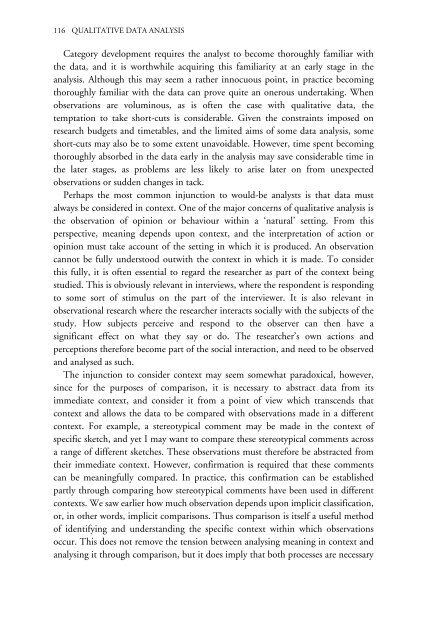Qualitative_data_analysis
Qualitative_data_analysis
Qualitative_data_analysis
Create successful ePaper yourself
Turn your PDF publications into a flip-book with our unique Google optimized e-Paper software.
116 QUALITATIVE DATA ANALYSIS<br />
Category development requires the analyst to become thoroughly familiar with<br />
the <strong>data</strong>, and it is worthwhile acquiring this familiarity at an early stage in the<br />
<strong>analysis</strong>. Although this may seem a rather innocuous point, in practice becoming<br />
thoroughly familiar with the <strong>data</strong> can prove quite an onerous undertaking. When<br />
observations are voluminous, as is often the case with qualitative <strong>data</strong>, the<br />
temptation to take short-cuts is considerable. Given the constraints imposed on<br />
research budgets and timetables, and the limited aims of some <strong>data</strong> <strong>analysis</strong>, some<br />
short-cuts may also be to some extent unavoidable. However, time spent becoming<br />
thoroughly absorbed in the <strong>data</strong> early in the <strong>analysis</strong> may save considerable time in<br />
the later stages, as problems are less likely to arise later on from unexpected<br />
observations or sudden changes in tack.<br />
Perhaps the most common injunction to would-be analysts is that <strong>data</strong> must<br />
always be considered in context. One of the major concerns of qualitative <strong>analysis</strong> is<br />
the observation of opinion or behaviour within a ‘natural’ setting. From this<br />
perspective, meaning depends upon context, and the interpretation of action or<br />
opinion must take account of the setting in which it is produced. An observation<br />
cannot be fully understood outwith the context in which it is made. To consider<br />
this fully, it is often essential to regard the researcher as part of the context being<br />
studied. This is obviously relevant in interviews, where the respondent is responding<br />
to some sort of stimulus on the part of the interviewer. It is also relevant in<br />
observational research where the researcher interacts socially with the subjects of the<br />
study. How subjects perceive and respond to the observer can then have a<br />
significant effect on what they say or do. The researcher’s own actions and<br />
perceptions therefore become part of the social interaction, and need to be observed<br />
and analysed as such.<br />
The injunction to consider context may seem somewhat paradoxical, however,<br />
since for the purposes of comparison, it is necessary to abstract <strong>data</strong> from its<br />
immediate context, and consider it from a point of view which transcends that<br />
context and allows the <strong>data</strong> to be compared with observations made in a different<br />
context. For example, a stereotypical comment may be made in the context of<br />
specific sketch, and yet I may want to compare these stereotypical comments across<br />
a range of different sketches. These observations must therefore be abstracted from<br />
their immediate context. However, confirmation is required that these comments<br />
can be meaningfully compared. In practice, this confirmation can be established<br />
partly through comparing how stereotypical comments have been used in different<br />
contexts. We saw earlier how much observation depends upon implicit classification,<br />
or, in other words, implicit comparisons. Thus comparison is itself a useful method<br />
of identifying and understanding the specific context within which observations<br />
occur. This does not remove the tension between analysing meaning in context and<br />
analysing it through comparison, but it does imply that both processes are necessary



